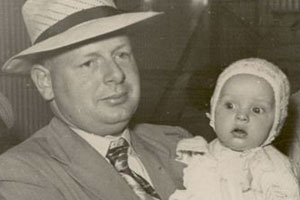REFLECTING on my life as a child in the 1950s made me realise just how much has changed since my late father, Lucius (pictured left with me as a baby), was a country GP.
I was born in 1951 — the same year as my grandmother’s untimely death from a hypertensive stroke as there was no effective treatment for “blood pressure”. It was also the year of the biggest poliomyelitis epidemic in Australian history.
My mother was a nurse and was called in to help — despite staff shortages, nurses were forbidden to work once they married — and she contracted polio. The Salk vaccine was yet a dream and it was common to see kids in steel callipers and iron lungs.
The following year my mother was nearly killed in a tractor accident when a disc plough ran over her. In the 1950s the only antibiotics were penicillin and sulfa, and many people died of tetanus.
As a second-year intern, my father worked at Willowburn, near Toowoomba, which was a hospital for the insane and psychotically depressed where shock treatment and rest were the only treatments available until the first antipsychotic, Largactil (chlorpromazine hydrochloride), appeared in 1955. It was 1949 when Melbourne psychiatrist John Cade first described lithium for bipolar disorder.
When my father considered moving to Ballina, in northern NSW, he was daunted by the dazzling array of surgical procedures done by his predecessor, in the days when the GP did midwifery, abdominal surgery, managed most fractures, “tonsils and adenoids” (a right of passage of nearly every kid in town) and anaesthetics with ether and a Schimmelbusch mask.
My father’s surgery was like a chemistry lab, with test tubes for boiling urine for protein, testing for sugar with tablets that changed colour, a haemoglobinometer with coloured glass inserts, a tube for erythrocyte sedimentation rates (ESRs), a microscope and slides for micro urine, plaster of Paris and plaster shears, bottles for pathology specimens, stomach pumps, kidney trays, ear syringes and so on.
His syringes were stainless steel and glass, wrapped in huckaback. He resharpened his needles and kept catgut in butter dishes of disinfectant. His steriliser was a cantilevered boiler. He did not have a fancy electrocardiograph machine as heart attacks were then diagnosed clinically and by a rise in the white cell count and ESR, which he did himself.
Pregnancy was diagnosed with urine on toads and pre-eclampsia by boiling urine with a methylated spirits burner and a test tube to which acetic acid was added. Asthma attacks were treated by subcutaneous adrenaline — “a minim a minute”.
Drug company reps were well regarded as they brought with them medical advances and news from the big smoke. He did surgery on weeknights after dinner, had no after-hours locum service and no appointment system.
At night, my mother patched rubber surgical gloves, covered them inside and out with talc and sterilised them for reuse — AIDS was unheard of. Our lounge room was a “spillover bay” from the attached surgery and thus my medical apprenticeship started in preschool.
As there was no Medicare, my father was often paid in kind — a mud crab, a quart of cream which Mum churned into butter, some freshly caught fish or prawns.
The doctor-patient bond was close; the doctor was greatly valued as he was the last bastion before death.
Back then, childhood had more freedom, and people and life were tougher. We had less material stuff but more simple riches and were arguably happier.
I have written a book about my happy adventure through childhood, Ballina Boy: a child’s odyssey through the 1950s.
Professor Roger Allen is a consultant thoracic and sleep physician based at the Wesley Hospital, Brisbane. His website is www.sarcoidosis.com.au
Posted 23 May 2011

 more_vert
more_vert
Yes the book Professor Roger Allen wrote about his life as a child, especially growing up with his Dad a Doctor & his Mum a Nurse. Also I’m a bit older than Professor Allen but as he said when we were growing up it was a great world. Yes medicine was somewhat primitive to now days but your life was mostly saved by yr GP. It’s sad now we don’t have that connection with our GP. I’ve been seeing Professor Roger Allen for many many years & yes he is the most caring Dr. I’ve ever been to. He’s very serious in his work & to me he’s the utmost best Dr ,Professor I’ve ever been too. Yes he’s very quick with a funny story or joke & that also makes him so very special. Congratulations Professor Roger Allen your the very best & thankyou for helping me for many years ❤️
I don’t know how I stumbled upon this but it brought back so many memories of two fine people. My first GP was Dr Malcolm Carseldine (he delivered 13 members of my extended family) and when he retired Dr Allen took over in my life. Your mother was such a lovely lady. I remember bringing our son down as he was ill and he vomited in the waiting room and I felt so guilty as I couldn’t get him outside fast enough. Mrs Allen said to me “Don’t worry about it, you don’t come here if you are well’. I laughed when you said he didn’t make appointments! I remember when he was ill and you came up to help out and you tried to bring in appointments! Well I imagine you were no sooner on the plane, when that went out the door! I remember your mother telling me about their first date, we laughed. Thank you for this.
I loved your book, and waiting for your next
Thank you Professor Allen for this beautiful post. I enjoyed reading it and had a glimpse of what was it to be at that time. Look forward to reading your book one of these days.